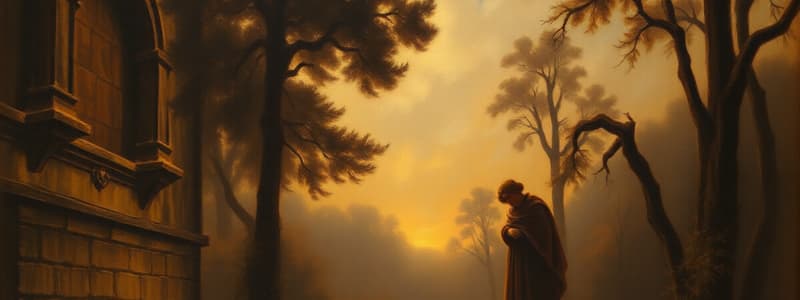Podcast
Questions and Answers
What characterizes significant historical events?
What characterizes significant historical events?
- They involve dramatic changes in civilization's trajectory. (correct)
- They are confined to specific geographical locations.
- They strictly relate to religious movements.
- They are always related to military conflicts.
What does the study of historical figures and events aim to achieve?
What does the study of historical figures and events aim to achieve?
- To focus solely on the political aspects of history.
- To emphasize the actions of heroic individuals.
- To create a comprehensive understanding of how the past contributed to the present. (correct)
- To provide a singular, fixed narrative of the past.
What influences historical narratives?
What influences historical narratives?
- Strict objectivity and lack of bias.
- The historian's personal perspective, values, and beliefs. (correct)
- Only documented facts without any subjective interpretation.
- The absence of social and cultural factors.
Why is understanding global history crucial?
Why is understanding global history crucial?
How does examining events from multiple perspectives affect historical understanding?
How does examining events from multiple perspectives affect historical understanding?
Which historical era is characterized by feudalism and the rise of Christianity?
Which historical era is characterized by feudalism and the rise of Christianity?
What is a primary source in historical research?
What is a primary source in historical research?
In which historical period did the Renaissance primarily occur?
In which historical period did the Renaissance primarily occur?
What is a key characteristic of the Modern History era?
What is a key characteristic of the Modern History era?
Which category of history relies on archeological findings due to a lack of written records?
Which category of history relies on archeological findings due to a lack of written records?
What is the main difference between primary and secondary sources?
What is the main difference between primary and secondary sources?
Which of the following is an example of a secondary source?
Which of the following is an example of a secondary source?
What is a significant characteristic of Ancient History?
What is a significant characteristic of Ancient History?
Flashcards
Pre-history
Pre-history
The period before written records, relying on archaeological findings to understand human development.
Ancient History
Ancient History
Encompasses the earliest known civilizations, including the Mesopotamian, Egyptian, Greek, and Roman empires.
Medieval History
Medieval History
Follows ancient history, spanning roughly from the 5th to the 15th centuries. Characterized by feudalism, the rise of Christianity, the Crusades, and the Black Death.
Early Modern History
Early Modern History
Signup and view all the flashcards
Modern History
Modern History
Signup and view all the flashcards
Primary Sources
Primary Sources
Signup and view all the flashcards
Secondary Sources
Secondary Sources
Signup and view all the flashcards
Historical Context
Historical Context
Signup and view all the flashcards
Historical Interpretation
Historical Interpretation
Signup and view all the flashcards
Global History
Global History
Signup and view all the flashcards
Multiple Interpretations
Multiple Interpretations
Signup and view all the flashcards
Global Interconnectedness
Global Interconnectedness
Signup and view all the flashcards
Significant Historical Events
Significant Historical Events
Signup and view all the flashcards
Study Notes
Historical Eras
- Historians categorize human history into eras, often based on significant societal shifts, technological advancements, or political events.
- These eras include pre-history, ancient history, medieval history, early modern history, and modern history.
- Different historians might categorize eras slightly differently.
- Pre-history is the period before written records, understanding it relies on archaeological discoveries.
Key Historical Periods
- Ancient History covers early civilizations like Mesopotamia, Egypt, Greece, and Rome, showcasing advancements in writing, governance, philosophy, and technology.
- Medieval History spans from the 5th to the 15th centuries. Key characteristics include feudalism, the rise of Christianity, the Crusades, and the Black Death.
- Early Modern History (roughly 15th-18th centuries) witnessed the Renaissance, Age of Exploration, Reformation, and the beginnings of the scientific revolution.
- Modern History (18th century to the present) includes the Industrial Revolution, World Wars, and the rise of global interconnectedness.
Historical Methodologies
- Historians use various methods, including primary and secondary source analysis, to understand the past.
- Primary sources are original documents or artifacts (e.g., letters, diaries, photographs, government records) providing firsthand accounts.
- Secondary sources are analyses of primary sources (e.g., books, articles) by historians.
- Critical analysis of sources and considering their context are vital elements of historical research.
- Historians strive to reconstruct past events, considering diverse perspectives and inherent biases.
Historical Figures and Events
- Historical figures (leaders, thinkers, artists) shaped societies and cultures.
- Significant historical events include wars, revolutions, scientific breakthroughs, religious and philosophical movements significantly impacting civilizations.
- Studying figures and events aims to understand the past's influence on the present, requiring a holistic approach.
Historical Narratives and Interpretations
- Historical accounts reflect the historian's perspective, influenced by values, beliefs, and political agendas.
- Varying interpretations exist depending on the source, author, and cultural background.
- Understanding diverse perspectives is crucial for a complete picture of any event.
- Multiple interpretations encourage critical thinking and appreciation for history's complexity.
Global History
- Global history is essential for understanding broader trends.
- Recognizing interconnectedness among societies and cultures is vital.
- Analyzing events from multiple perspectives counters ethnocentrism.
- Trade, migration, and the exchange of ideas significantly shaped global developments.
Studying That Suits You
Use AI to generate personalized quizzes and flashcards to suit your learning preferences.




